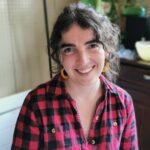
Aurore Gonzalez è un’assegnista di ricerca coinvolta nel progetto europeo LeibnizDream “Realizing Leibniz’s Dream: Child Languages as a Mirror of the Mind” (Responsabili del progetto: Artemis Alexiadou (HU), Maria Teresa Guasti (UniMiB) e Uli Sauerland (ZAS)). Ha conseguito il suo dottorato di ricerca all’Università di Harvard nel mese di Gennaio 2021, con una tesi sulle domande polari e sulle particelle interrogative supervisionata da Gennaro Chierchia (Università di Harvard).
La sua ricerca è incentrata sulla semantica delle lingue naturale e sull’interfaccia della stessa con sintassi e pragmatica. Nel suo lavoro, Aurore unisce un approccio formale a metodi di indagine crosslinguistici e sperimentali. Tra i temi da lei trattati figurano: le domande polari, la polarità negativa, le congiunzioni negative e i non condizionali.